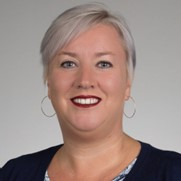MLA | SLA ’23 Continuing Education: Meet Heather Holmes, the Instructor of “Research for the Non-Researcher”
 In the weeks leading up to MLA | SLA ’23 in Detroit, we’ll profile the conference continuing education instructors and their courses. We end the series this week with Heather Holmes, AHIP, the instructor of Research for the Non-Researcher, who explains how she got interested in research and how her course can help you develop skills that will enable you to better serve your library and advance in your career.
In the weeks leading up to MLA | SLA ’23 in Detroit, we’ll profile the conference continuing education instructors and their courses. We end the series this week with Heather Holmes, AHIP, the instructor of Research for the Non-Researcher, who explains how she got interested in research and how her course can help you develop skills that will enable you to better serve your library and advance in your career.
To see all the CE courses, visit MLA | SLA ’23 Continuing Education. If you’ve already registered for the conference, open the Registration Form and click ”Already Registered” to add a course.
What are you most looking forward to seeing/eating/experiencing in Detroit?
The best part about the annual meeting for me is getting to see and catch up with colleagues from around the country (and world!). It was great last year to get back to “normal.” I’m looking forward to this year’s meeting, and I hope a lot of people will attend. Giving and listening to presentations is great, but having time to talk with people and learn more about what they’ve been up to is the real treat of the annual meeting.
What problems, obstacles, or lack of knowledge might your intended audience experience that your course addresses?
Most health science librarians teach or support EBM/EBP. We are used to getting requests for the latest evidence on a topic, and we excel at being able to find it. Being on the research side, though, is very different. It’s like the difference between having a great meal and knowing how the meal was made. Learning more about what research is and all that it encompasses, rather than only knowing about it in the form of its output as a published paper, will give you a deeper understanding of the work we do. This is true for all librarians, not just those in the health sciences!
What practical, immediately applicable information or skills will learners gain from your course?
What is research? What is the research process? How does someone get started with research? Why does research need to be done? These are the questions I will help learners answer. Most importantly, I would love for learners to leave my class with an interest in Evidence-Based Library and Information Practice (EBLIP) and inspired to do their own research. Research doesn’t just apply to basic and clinical sciences. Library and information science professionals in all types of libraries also do research. And, as students will see, research doesn’t have to be scary!
How will your course help learners provide value to their employers and advance in their careers?
First, I hope it helps them have a better understanding of the very important work they do every day. Second, I hope that they will take an interest in EBLIP and begin to do their own research. Regardless of the type of library they work in, being able to add this value can contribute to promotion and tenure, and in being able to make a case for a library to stay open or get a budget increase.
How did you get interested in your topic and what most excites you about it?
Through learning about medical errors and how they can help be prevented by proper use of evidence. While there is much (much) more to it, a health care provider asking a librarian to review evidence can catch something that may have otherwise been missed. Medical errors are one of the things that led to having an interprofessional team in patient care. A librarian is an essential part of such a team—especially a librarian that has a solid understanding of research.
What’s the main thing you want learners to take away from your course?
The importance of research—how and why it is done, how it can make a difference—and that it doesn’t have to be intimidating!

